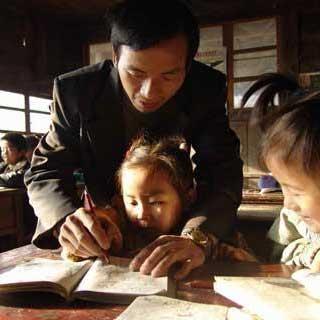
介绍:
Since China’s reform-and-opening up period, rural areas have experienced a wide gap in access to education resources compared to urban areas. The central problem is that of attracting well-qualified teachers to places that might be underdeveloped or underprivileged. Even more importantly, rural schools cannot afford to pay their teachers as much as urban schools can. As an expert at an education research institute said, teaching at rural schools is not only more difficult for the teachers, but also less profitable.
The Chinese government is trying to improve the quality of rural education, and the centerpiece of their strategy is to lure more qualified teachers into rural areas.
Of the 3.3 million teachers in rural areas, many of them are in their late 40s or 50s, with little training. They earn much less than their urban counterparts, and are often expected to teach several subjects at the same time, to offset a shortage of educators. Naturally, forcing teachers to teach multiple subjects, some of which they may not be qualified to teach, tends to decrease the quality of instruction.
A plan by the State Council, China’s cabinet, which was announced on June 8, came in four parts. The first is to match teacher salaries at rural schools to levels at urban schools. Second, college graduates will be permitted to waive their student loans if they teach at a rural school for a certain period of time. Third, teachers can first serve at a rural school or a school with fewer resources, to be put on a faster career track. And, finally, distinguished teachers will be offered greater incentives to help at rural schools after retirement.
An expert said, "To narrow the divide, rural teachers must at least be given the same level of benefits because it is harder and much more painstaking to teach at rural schools.”
For Caixin online, this is Samuel Liu.
6月8日,国务院办公厅公布了日前下发的《乡村教师支持计划(2015-2020年)》,全面部署乡村教师队伍建设工作。教育部有关负责人在答记者问时坦言,“补充难、补充质量不高,是乡村教师队伍长期以来面临的‘老大难’问题”。
《计划》亦承认,到2020年中国基本实现教育现代化的过程中,“薄弱环节和短板在乡村,在中西部老少边穷岛等边远贫困地区”。
为发展乡村教育,帮助乡村孩子学习成才、阻止贫困现象代际传递,《计划》宣示,“发展乡村教育,教师是关键”,“必须把乡村教师队伍建设摆在优先发展的战略地位”。
目前,全国约有乡村教师330万人,但因受城乡发展不平衡、交通地理条件不便、学校办学条件欠缺等多重因素影响,长期以来,乡村教师队伍面临着职业吸引力不强、人才补充渠道不畅、优质资源配置不足、人员组成结构不尽合理、整体素质不高等突出问题,制约了乡村教育持续健康发展。
而在这份日前印发的《计划》中,中央即针对乡村教师“下不去”“留不住”“教不好”等突出问题,提出了数方面的支持发展举措包括拓展乡村教师补充渠道;第三,提高乡村教师生活待遇;第四,统一城乡教职工编制标准;第五,职称(职务)评聘向乡村学校倾斜;第六,推动城镇优秀教师向乡村学校流动;第七,全面提升乡村教师能力素质;第八,建立乡村教师荣誉制度。
其中,针对乡村教师队伍长期面临的人才“补充难、补充质量不高”等“老大难”问题,《计划》具体要求各省级人民政府要建立统筹规划、统一选拔的乡村教师补充机制;扩大“特岗计划”的实施规模,重点支持边远和贫困地区补充乡村教师,“适时提高特岗教师工资性补助标准”。
同时,鼓励地方政府和师范院校采取多种方式定向培养“一专多能”的乡村教师。而高校毕业生若取得教师资格并到乡村学校任教满一定期限后,则可按有关规定,享受学费补偿和国家助学贷款代偿政策。此外,政府还将鼓励从城镇退休的特级教师、高级教师,到乡村学校支教讲学。
21世纪教育研究院副院长熊丙奇认为,推进教育公平,重点建设乡村教育,对中国来说,最关键的是要提高乡村教师待遇。“政府发展教育的基本职责是促进公平,要缩小乡村教育和城市教育的差距,必须有至少和城市学校一样的师资”,农村环境相比城市更加艰苦,如果乡村教师待遇远低于城市,很难吸引优秀人才。
大家还在听

